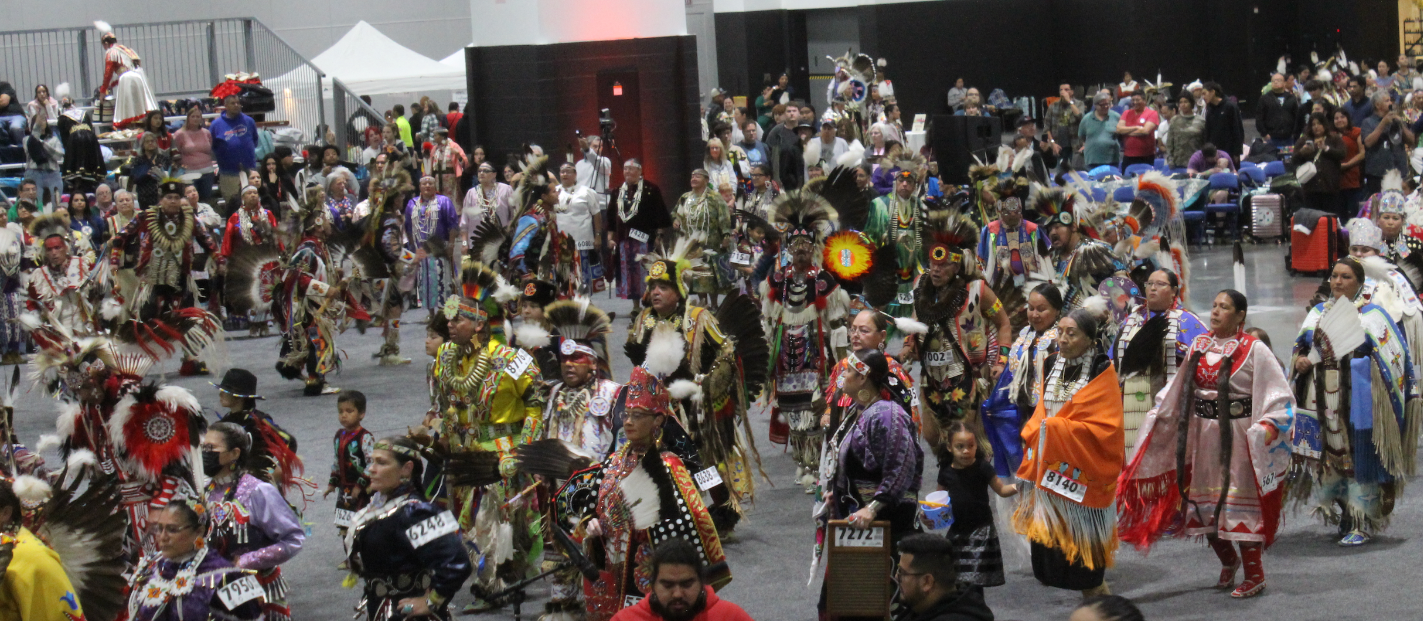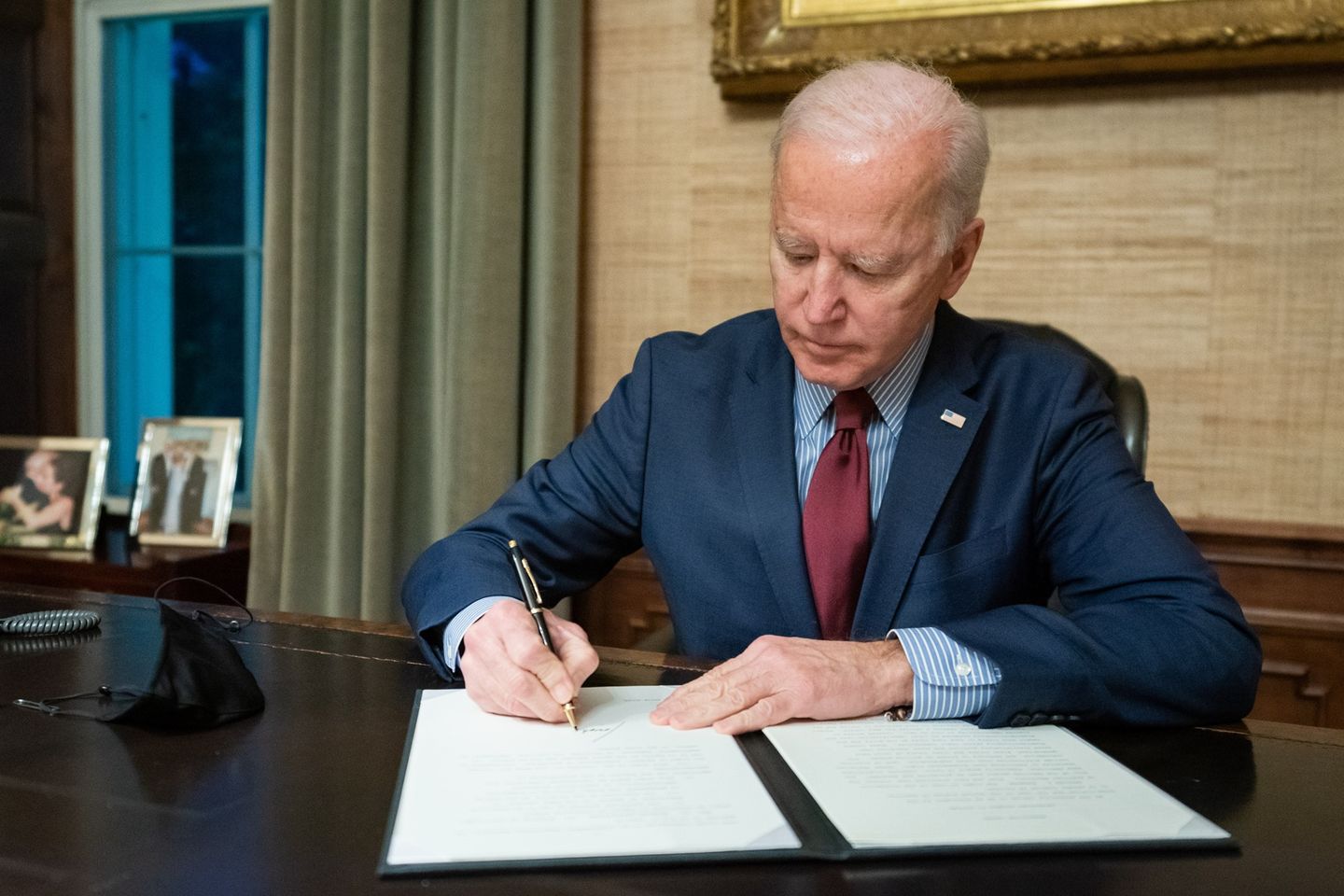
- Details
- By Levi Rickert
WASHINGTON — President Joe Biden on Thursday proclaimed November 2024 as Native American Heritage Month.
In the presidential proclamation below, the president said: "Indigenous peoples’ history in the United States is defined by strength, survival, and a deep commitment to and pride in their heritage, right to self-governance, and ways of life."
President Biden referenced his visit last week to the Gila River Indian Reservation where he issued an apology on behalf of the United States government's role in the physical, emotional, and sexual abuse of thousands of Native American students at Indian boarding schools.
Read the full proclamation below:
NATIVE AMERICAN HERITAGE MONTH
BY THE PRESIDENT OF THE UNITED STATES OF AMERICA
During National Native American Heritage Month, we honor the history, rich cultures, and vast contributions of Native peoples. We celebrate the hundreds of Tribal Nations that are ushering in a new era in our Nation-to-Nation relationships. And we recommit to respecting Tribal sovereignty and self-determination and working in partnership with Tribal Nations to bring new prosperity and security to Native peoples.
Indigenous peoples’ history in the United States is defined by strength, survival, and a deep commitment to and pride in their heritage, right to self-governance, and ways of life. Native peoples have built and sustained powerful Tribal Nations, and the knowledge they developed still benefits us today. However, our Nation’s failed policies of the past subjected generations of Native peoples to cruelty, violence, and intimidation. The forced removal of Native peoples from their homes and ancestral homelands; attempts to assimilate entire generations; and stripping of Indigenous peoples of their identities, cultures, and traditions are some of the darkest chapters of our Nation’s history. The trauma and turmoil fundamentally altered their communities. As the first President to visit Indian Country in 10 years, I delivered a national apology for the unspeakable harms caused to Native peoples at Federal Indian Boarding Schools.
Indigenous peoples have persisted and survived — a testament to their resilience and resolve. Today, Native communities are leading the way forward and continuing to strengthen the fabric of the United States. They have long served in the United States military and currently serve in the highest levels of government — including the Secretary of the Interior, Deb Haaland, America’s first Native American Cabinet secretary. In every field and sector, Native peoples are pushing for progress and contributing to our shared prosperity.

Since I came into office, the Federal Government has made record investments in Tribal Nations. Federal contracts with Native American-owned companies increased by over $8 billion from 2020 to 2023. My American Rescue Plan made the largest direct Federal investment in Tribal Nations ever, helping vaccinate Tribal communities during the COVID-19 pandemic and keeping the economy going. My Bipartisan Infrastructure Law made the single biggest investment in Tribal roads, bridges, water, high-speed internet, electricity, irrigation, environmental cleanup, and so much more. My Inflation Reduction Act made the biggest investment in fighting climate change ever — including funding to help Tribal communities lead in the just transition to clean energy and ease the impact of droughts, wildfires, and rising sea levels, which threaten Native lives and precious homelands.
My Administration is also working to ensure that Native communities are safe and secure and have the resources they need to thrive. I signed an Executive Order that improves the Federal response to the epidemic of missing and murdered Indigenous peoples. When we reauthorized the Violence Against Women Act in 2022, we included historic provisions to reaffirm Tribal sovereignty and expand Tribal jurisdiction in cases where outside perpetrators harm members of their Nation. And for the first time ever, my Administration also secured advance funding for the Indian Health Service so hospitals can plan ahead, order supplies, and hire doctors. We have provided historic funding to Tribal communities to help fight the behavioral health crisis and taken significant steps to improve maternal health for Native American women, who are twice as likely to die from pregnancy-related complications as white women.
I have always believed that we must know the good, the bad, and the truth of who we are as a Nation — we must acknowledge our history so that we can begin to remember and heal. That is why I became the first President to issue a formal apology for the Federal Indian Boarding School era, one of the most horrific chapters in our Nation’s history. For 150 years, the Federal Government mandated the removal of Native children from their families and Tribes — and as a result, generations of Native children had their childhoods stolen and whole Tribal cultures were erased. I am proud to formally end the silence surrounding this shameful era and I remain proud that my Administration defended the Indian Child Welfare Act in court, ensuring that our Nation respects Tribal sovereignty and protects Native children by helping Native families stay together and grow up with their languages and cultures. And we are working to support Native American families and communities as they heal from the Federal Indian Boarding School era through the Department of the Interior’s Road to Healing initiative and by supporting Native language preservation and public safety initiatives.
My Administration has also worked with Tribal Nations to preserve, protect, and steward important ancestral Tribal lands and waters. Through more than 200 co-stewardship and co-management agreements signed under my leadership, we are working side by side with Tribes to make decisions about how to manage the lands that are most precious to them. And to date, I have protected and conserved more than 45 million acres of our Nation’s lands and waters. That includes the Chumash Heritage National Marine Sanctuary, vast offshore waters off California’s coast and the first sanctuary to be proposed by Indigenous communities. I have also established, expanded, and restored 11 national monuments, many containing sites considered sacred to Tribal Nations — from Bears Ears National Monument, Grand Staircase-Escalante National Monument, and Avi Kwa Ame National Monument to Baaj Nwaavjo I’tah Kukveni-Ancestral Footprints of the Grand Canyon National Monument, Berryessa Snow Mountain National Monument, and others.
During National Native American Heritage Month, we honor the heritage and contributions of Native peoples, and we work tirelessly to build a future grounded in dignity, respect, and partnership. We remain committed to working with Native communities to write a new and better chapter in American history for Tribal Nations — one that honors the solemn promise the United States made to Tribal Nations, fulfills our Federal trust and treaty obligations, and works together to rebuild Tribal economies and institutions.
NOW, THEREFORE, I, JOSEPH R. BIDEN JR., President of the United States of America, by virtue of the authority vested in me by the Constitution and the laws of the United States, do hereby proclaim November 2024 as National Native American Heritage Month. I urge all Americans, as well as their elected representatives at the Federal, State, and local levels, to observe this month with appropriate programs, ceremonies, and activities. Also, I urge all Americans to celebrate November 29, 2024, as Native American Heritage Day.
IN WITNESS WHEREOF, I have hereunto set my hand this thirty-first day of October, in the year of our Lord two thousand twenty-four, and of the Independence of the United States of America the two hundred and forty-ninth.
JOSEPH R. BIDEN JR.
More Stories Like This
Native News Weekly (August 25, 2024): D.C. BriefsNavajo Nation Mourns the Passing of Former Vice President Rex Lee Jim
Deb Haaland Earns Endorsement From Communications Workers of America Local 7076
University Soccer Standout Leads by Example
Two Native Americans Named to Democratic Congressional Campaign Committee's“Red to Blue” Program
Help us defend tribal sovereignty.
At Native News Online, our mission is rooted in telling the stories that strengthen sovereignty and uplift Indigenous voices — not just at year’s end, but every single day.
Because of your generosity last year, we were able to keep our reporters on the ground in tribal communities, at national gatherings and in the halls of Congress — covering the issues that matter most to Indian Country: sovereignty, culture, education, health and economic opportunity.
That support sustained us through a tough year in 2025. Now, as we look to the year ahead, we need your help right now to ensure warrior journalism remains strong — reporting that defends tribal sovereignty, amplifies Native truth, and holds power accountable.
 The stakes couldn't be higher. Your support keeps Native voices heard, Native stories told and Native sovereignty defended.
The stakes couldn't be higher. Your support keeps Native voices heard, Native stories told and Native sovereignty defended.
Stand with Warrior Journalism today.
Levi Rickert (Potawatomi), Editor & Publisher

